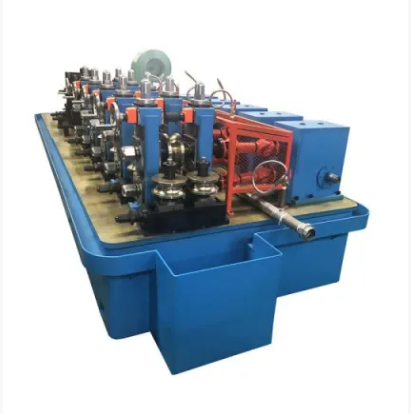Enhanced Production Efficiency with High-Quality Machinery
Automated Processes for Increased Output
Bringing automation into manufacturing really boosts how fast things get made. Research indicates that factories using these systems see their output jump around 40% or so, helping them keep up with what customers want when they need it. The main reason? Factories install sophisticated machines programmed with robotics to make everything run smoother. These setups produce goods that look pretty much the same every time and cut down on mistakes people tend to make, something that causes all sorts of holdups and wasted materials. Automated lines also let companies do what's called just-in-time manufacturing. That means they can react to sudden changes in what buyers are asking for without stockpiling tons of stuff sitting around collecting dust. And this approach saves money too since there's less need for big warehouses full of inventory.
Reducing Labor Costs Through Precision Engineering
When factories install good quality machines built with precise engineering, they need far fewer workers to handle complicated production jobs that used to take hours manually. The numbers tell the story too many plants see their payroll expenses drop around 30% after automation kicks in. What's even better is how these precision parts cut down on wasted materials. Less scrap means fewer costly fixes later on, which matters a lot when trying to keep prices competitive against rivals. Manufacturing shops across different sectors have found that cutting back on staff hours while making products faster and better quality helps them run smoother day to day. For manufacturers looking at long term viability, investing in precision engineering isn't just about saving money upfront it builds a foundation for both environmental responsibility and bottom line growth over time.
Long-Term Cost Savings and ROI Advantages
Lower Energy Consumption and Operational Costs
When companies invest in quality steel pipe making equipment, they typically see big cuts in their energy bills. Modern machines come packed with features designed to cut power usage, sometimes slashing it by around 25%. That means less money going out the door each month for utilities, which naturally boosts bottom line numbers. Most businesses report seeing their initial investment pay off within three to five years of installation. Beyond just saving cash though, reduced energy draw helps factories meet green standards while still keeping production running smoothly. Some manufacturers have even told us how these upgrades made them eligible for certain environmental certifications that opened up new markets for their products.
Minimizing Downtime for Consistent Productivity
Good quality machinery gets built to last, which means less time sitting idle and more steady work getting done. Facilities that keep their equipment running without constant hiccups typically hit around 90% uptime or better, so production keeps going without those frustrating stoppages. Regular checkups combined with solid parts make all the difference here. Machines just run better when they're properly maintained, saving money over time on repairs and replacements. Reliable equipment matters a lot for keeping productivity up. When machines perform consistently day after day, operations don't stall out, and this leads to more products coming off the line and better bottom line results for manufacturers.
Superior Steel Pipe Quality and Consistency
Precision Manufacturing for Fewer Defects
Getting precision right matters a lot when it comes to making good steel pipes that don't have flaws. When manufacturers invest in modern equipment equipped with the latest precision tech, they can get defect rates down to around half a percent. That's pretty impressive considering how much better the end products look and perform. Fewer defects mean less material goes to waste, which naturally leads to happier customers who come back for more orders. The machines themselves play a huge role here, especially those with built-in quality monitoring systems that watch every step of production in real time. These systems keep things consistent across batches so the final products meet specifications without needing constant fixes or expensive adjustments later on.
Material Durability in Demanding Environments
Getting good quality machines matters a lot when making steel pipes that can last through tough situations. The pipes themselves need to handle pretty harsh stuff out there in the field. They're built to take heat, pressure changes, and whatever else comes their way without falling apart. When pipes last longer without breaking down, companies save money because they don't have to replace them so often or fix problems constantly. Better equipment means manufacturers keep turning out pipes that meet those strict requirements everyone talks about in the industry. Meeting these standards isn't just about checking boxes though it actually builds trust with customers who want something solid they can count on for years instead of months.
Compliance with Industry Standards and Safety
Meeting Global Regulatory Requirements
Steel pipe manufacturing equipment that meets international standards like ISO and ASTM helps manufacturers stay compliant with those important regulations they need to follow. When companies actually stick to these standards, it keeps them in good standing within markets where non-compliance can lead to serious fines sometimes running into thousands of dollars. Following global regulations does more than just keep businesses operating legally though. It actually gives them better positioning against competitors who might be cutting corners. The smart manufacturers watch what's happening with regulations before changes happen. This proactive approach lets them adjust production methods early on, which means they often end up leading the pack when it comes to safety practices and compliance standards across the industry.
Built-In Safety Protocols for Risk Mitigation
Modern steel pipe manufacturing equipment now incorporates sophisticated safety mechanisms that have cut down on workplace injuries. Most contemporary machines feature emergency stop buttons, protective guards around moving parts, and automatic shut-offs when sensors detect unsafe conditions. These improvements help keep workers safe while also cutting down on lost production time from incidents. The inclusion of real-time monitoring technology means potential problems get spotted early enough for operators to take corrective action before they escalate into full-blown accidents. Beyond just keeping people safe, this focus on prevention actually makes factories run better too since there's less interruption to daily operations. As a result, many plants report both fewer injuries and higher output levels after upgrading their safety systems.
Durability and Reduced Maintenance Needs
Robust Construction for Extended Lifespan
Steel pipe making machines built to high standards stand out because they're constructed with real durability in mind, and this definitely adds years to how long they last on the factory floor. The manufacturers use heavy duty components throughout these machines, things like reinforced steel frames and wear-resistant coatings, so they actually hold up against constant operation without falling apart after just a few months. When companies spend money on this kind of solid machinery, they typically see better returns over time. The equipment keeps working properly much longer than cheaper models do, which cuts down on downtime and repair costs. Factories that have made the switch report noticeable savings in their bottom line too. After all, nobody wants to keep replacing expensive machinery every couple of years when good quality stuff lasts decade after decade with proper maintenance.
Predictive Maintenance Capabilities
Modern steel pipe manufacturing equipment now includes smart systems for predicting when parts might fail. These built-in sensors spot problems long before they become serious issues, often catching wear patterns or temperature anomalies that would otherwise go unnoticed. Factories report around 70% less downtime since implementing this kind of monitoring system, which means production lines keep running instead of grinding to a halt unexpectedly. The technology extends how long machinery lasts between replacements while saving money on emergency repairs. For plant managers, investing in predictive maintenance isn't just about avoiding breakdowns it directly impacts bottom line results through smoother day-to-day operations and lower repair bills across the facility.
FAQ Section
What are the benefits of automated processes in manufacturing?
Automated processes in manufacturing enhance production efficiency, increase output rates, guarantee product quality consistency, minimize human error, and facilitate just-in-time production, reducing storage costs.
How does precision engineering reduce labor costs?
Precision engineering in high-quality machinery reduces the need for manual labor by automating intricate tasks and decreasing material waste, which significantly lowers labor and rework costs.
Why is energy efficiency important in steel pipe making machines?
Energy-efficient steel pipe making machines reduce operational costs and energy consumption, enhancing long-term profitability and contributing to sustainable manufacturing processes.
How do built-in safety protocols benefit manufacturing environments?
Built-in safety protocols reduce workplace accidents, lower incident-related downtime, and enhance workplace security, ultimately boosting productivity.
What role does predictive maintenance play in machinery longevity?
Predictive maintenance forecasts maintenance needs before issues escalate, reducing downtime and prolonging machinery lifespan, achieving seamless operations and reducing maintenance costs.
Table of Contents
- Enhanced Production Efficiency with High-Quality Machinery
- Long-Term Cost Savings and ROI Advantages
- Superior Steel Pipe Quality and Consistency
- Compliance with Industry Standards and Safety
- Durability and Reduced Maintenance Needs
-
FAQ Section
- What are the benefits of automated processes in manufacturing?
- How does precision engineering reduce labor costs?
- Why is energy efficiency important in steel pipe making machines?
- How do built-in safety protocols benefit manufacturing environments?
- What role does predictive maintenance play in machinery longevity?

